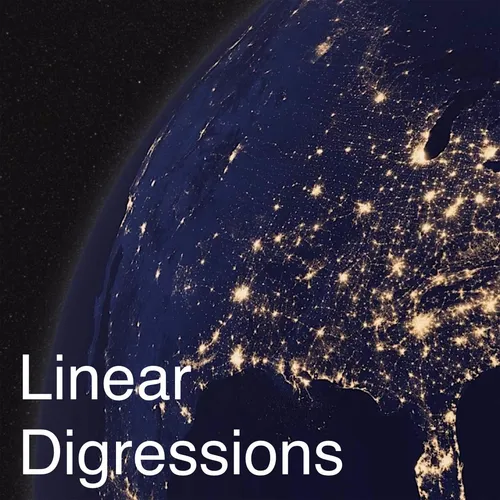
Linear Digressions
In each episode, your hosts explore machine learning and data science through interesting (and often very unusual) applications.
- Update frequency
- every 6 days
- Average duration
- 19 minutes
- Episodes
- 291
- Years Active
- 2014 - 2020

Model Interpretation (and Trust Issues)
Machine learning algorithms can be black boxes--inputs go in, outputs come out, and what happens in the middle is anybody's guess. But understanding how a model arrives at an answer is critical for …
00:16:57 |
Mon 25 Apr 2016

Updates! Political Science Fraud and AlphaGo
We've got updates for you about topics from past shows! First, the political science scandal of the year 2015 has a new chapter, we'll remind you about the original story and then dive into what has…
00:31:43 |
Mon 18 Apr 2016

Ecological Inference and Simpson's Paradox
Simpson's paradox is the data science equivalent of looking through one eye and seeing a very clear trend, and then looking through the other eye and seeing the very clear opposite trend. In one cas…
00:18:32 |
Mon 11 Apr 2016

Discriminatory Algorithms
Sometimes when we say an algorithm discriminates, we mean it can tell the difference between two types of items. But in this episode, we'll talk about another, more troublesome side to discriminatio…
00:15:21 |
Mon 04 Apr 2016

Recommendation Engines and Privacy
This episode started out as a discussion of recommendation engines, like Netflix uses to suggest movies. There's still a lot of that in here. But a related topic, which is both interesting and impo…
00:31:33 |
Mon 28 Mar 2016

Neural nets play cops and robbers (AKA generative adverserial networks)
One neural net is creating counterfeit bills and passing them off to a second neural net, which is trying to distinguish the real money from the fakes. Result: two neural nets that are better than e…
00:18:56 |
Mon 21 Mar 2016

A Data Scientist's View of the Fight against Cancer
In this episode, we're taking many episodes' worth of insights and unpacking an extremely complex and important question--in what ways are we winning the fight against cancer, where might that fight …
00:19:08 |
Mon 14 Mar 2016

Congress Bots and DeepDrumpf
Hey, sick of the election yet? Fear not, there are algorithms that can automagically generate political-ish speech so that we never need to be without an endless supply of Congressional speeches and…
00:20:47 |
Fri 11 Mar 2016

Multi - Armed Bandits
Multi-armed bandits: how to take your randomized experiment and make it harder better faster stronger. Basically, a multi-armed bandit experiment allows you to optimize for both learning and making …
00:11:29 |
Mon 07 Mar 2016

Experiments and Messy, Tricky Causality
"People with a family history of heart disease are more likely to eat healthy foods, and have a high incidence of heart attacks." Did the healthy food cause the heart attacks? Probably not. But es…
00:16:59 |
Fri 04 Mar 2016

Backpropagation
The reason that neural nets are taking over the world right now is because they can be efficiently trained with the backpropagation algorithm. In short, backprop allows you to adjust the weights of …
00:12:21 |
Mon 29 Feb 2016

Text Analysis on the State Of The Union
First up in this episode: a crash course in natural language processing, and important steps if you want to use machine learning techniques on text data. Then we'll take that NLP know-how and talk a…
00:22:22 |
Fri 26 Feb 2016

Paradigms in Artificial Intelligence
Artificial intelligence includes a number of different strategies for how to make machines more intelligent, and often more human-like, in their ability to learn and solve problems. An ambitious gro…
00:17:20 |
Mon 22 Feb 2016

Survival Analysis
Survival analysis is all about studying how long until an event occurs--it's used in marketing to study how long a customer stays with a service, in epidemiology to estimate the duration of survival …
00:15:21 |
Fri 19 Feb 2016

Gravitational Waves
All aboard the gravitational waves bandwagon--with the first direct observation of gravitational waves announced this week, Katie's dusting off her physics PhD for a very special gravity-related epis…
00:20:26 |
Mon 15 Feb 2016

The Turing Test
Let's imagine a future in which a truly intelligent computer program exists. How would it convince us (humanity) that it was intelligent? Alan Turing's answer to this question, proposed over 60 yea…
00:15:15 |
Fri 12 Feb 2016

Item Response Theory: how smart ARE you?
Psychometrics is all about measuring the psychological characteristics of people; for example, scholastic aptitude. How is this done? Tests, of course! But there's a chicken-and-egg problem here: …
00:11:46 |
Mon 08 Feb 2016

Go!
As you may have heard, a computer beat a world-class human player in Go last week. As recently as a year ago the prediction was that it would take a decade to get to this point, yet here we are, in …
00:19:59 |
Fri 05 Feb 2016

Great Social Networks in History
The Medici were one of the great ruling families of Europe during the Renaissance. How did they come to rule? Not power, or money, or armies, but through the strength of their social network. And …
00:12:42 |
Mon 01 Feb 2016

How Much to Pay a Spy (and a lil' more auctions)
A few small encores on auction theory, and then--how can you value a piece of information before you know what it is? Decision theory has some pointers. Some highly relevant information if you are …
00:16:59 |
Fri 29 Jan 2016
Disclaimer: The podcast and artwork embedded on this page are the property of Ben Jaffe and Katie Malone ([email protected]). This content is not affiliated with or endorsed by eachpod.com.